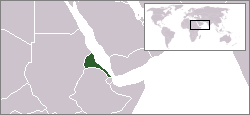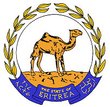Eritrea
|
|
| |||||
| National motto: None | |||||

| |||||
| Official languages | Tigrigna, Arabic and English | ||||
| Capital | Asmara | ||||
| President | Isaias Afewerki | ||||
| Area - Total - % water | Ranked 97th 121,320 km² Negligible | ||||
| Population - Estimated (2005) - Total (2002) - Density | Ranked 115th 4,561,599 4,298,269 38/km² (135th) | ||||
| GDP (PPP) - Total - Per capita | 2005 estimate 4,250 (155th) 917 (177th) | ||||
| Independence - Limited - Fully | From Ethiopia May 29, 1991 May 24, 1993 | ||||
| Currency | Nakfa | ||||
| Time zone | UTC +3 | ||||
| National anthem | Ertra, Ertra, Ertra | ||||
| Internet TLD | .er | ||||
| Calling Code | 291 | ||||
The State of Eritrea is a country in northeast Africa. It is bordered by Sudan in the west, Ethiopia in the south, and Djibouti in the Southeast. The East and Northeast of the country has an extensive coastline with the Red Sea. Having achieved independence on May 24, 1993 from Ethiopia, it is one of the youngest independent states.
| Contents |
Name
The name Eritrea is the Italian form of the Greek name ΕΡΥΘΡΑΙΑ (Erythra'), which derives from ΕΡΥΘΡΑ ΘΑΛΑΣΣΑ (Erythrà hᬡssa), the Greek name for the Red Sea.
History
Main article: History of Eritrea
Eritrea had been ruled by many powers before it was colonised by the Italians in 1885. The Italians remained in power until they were defeated by Allied forces in World War II (1941), and Eritrea became a British protectorate. After the war, the United Nations eventually decided that the area was to become part of a federation with Ethiopia. When Eritrean independence fighters rioted in the early 1960s, the land was annexed by Ethiopia, starting a 30-year long civil war.
This war ended in 1991, when Eritrean forces defeated the Ethiopian army. Two years later, after a referendum, independence was declared.
In 1998, a border war with Ethiopia broke out which killed thousands of soldiers from both countries and left Eritrea with significant economic and social stresses, including massive population displacement, reduced economic development, and one of Africa's more severe landmine problems. The Ethiopia-Eritrea War ended in 2000 with a negotiated agreement known as the Algiers Agreement. One of the terms of the agreement was the establishment of a UN peacekeeping operation, known as the United Nations Mission in Eritrea and Ethiopia (UNMEE); over 4,000 UN peacekeepers remain as of August 2004. Another term of the Algiers Agreement was the establishment of a final demarcation of the disputed border area between Eritrea and Ethiopia. An independent, UN-associated boundary commission known as the Ethiopian-Eritrean Boundary Commission (EEBC), after extensive study, issued a final border ruling in 2003, but its decision was rejected by Ethiopia. As of June 2005 the border question remains in dispute, even while a tentative peace remains in place.
Politics
Main article: Politics of Eritrea
Because the Eritrean constitution is not yet in effect, the unicameral Eritrean parliament, the National Assembly, is entirely populated by members of the People's Front for Democracy and Justice (PFDJ). This assembly of 150 seats, formed in 1993 shortly after independence, elected the current president, Isaias Afewerki. National elections have been periodically scheduled and cancelled. Independent local sources of political information on Eritrean domestic politics are scarce; in 2001 the government closed down all of the nation's privately owned print media and outspoken critics of the government have been allegedly arrested and held without trial, according to various international observers including Human Rights Watch and Amnesty International. In 2004 the U.S. State Department declared Eritrea a Country of Particular Concern (CPC) for its record of religious persecution (see below).
Regions
Main article: Regions of Eritrea
Eritrea is divided into 6 regions:
- Central (Maekel)
- Anseba
- Southern Red Sea (Debubawi-Keih-Bahri)
- Northern Red Sea (Semienawi-Keih-Bahri)
- Southern (Debub)
- Gash-Barka
Geography
Main article: Geography of Eritrea
Er-map.gif
Image:Er-map.gif
Eritrea is located in the Horn of Africa and is bordered on the northeast and east by the Red Sea. Off the sandy and arid coastline, the Dahlak Archipelago are situated, an archipelago with fishing grounds. The land to the south, in the highlands, is slightly less dry, and cooler. The highest point of the country, Soira, is located in the centre of Eritrea, at 3018 m above sea level.
The main cities of the country are the capital city of Asmara, the port town of Assab in the southeast, as well as the towns of Massawa and Keren.
Economy
Main article: Economy of Eritrea
Since independence from Ethiopia, Eritrea has faced the economic problems of a small, desperately poor country. Like the economies of many African nations, the economy is largely based on subsistence agriculture, with 80% of the population involved in farming and herding.
The Ethiopian-Eritrea war severely hurt Eritrea's economy. GDP growth in 1999 fell to less than 1%, and GDP decreased by 8.2% in 2000. The May 2000 Ethiopian offensive into northern Eritrea caused some $600 million in property damage and loss, including losses of $225 million in livestock and 55,000 homes. The attack prevented planting of crops in Eritrea's most productive region, causing food production to drop by 62%.
Even during the war, Eritrea developed its transportation infrastructure, asphalting new roads, improving its ports, and repairing war damaged roads and bridges. Eritrea's economic future remains mixed. The cessation of Ethiopian trade, which mainly used Eritrean ports before the war, leaves Eritrea with a large economic hole to fill. Eritrea's economic future depends upon its ability to master fundamental social problems like illiteracy, unemployment, and low skills, and to convert its diaspora money and expertise into economic growth.
Eritrea is at the brink of a famine, with food supplies currently (February 2005) only lasting for one month.
Demographics
Main article: Demographics of Eritrea
Eritrea's two main ethnic groups are the Tigrigna, which forms about half of the population, and the Tigre and Kunama, which amount to 40%. The remaining people are the Afar, Bilen, Nara, Rashaida, Hidarb, and Saho. The local Tigrignan and the wider Arabic language are the two predominant languages for official purposes, but Amharic languages as well as English and Italian are also spoken.
Religion
The dominant religions are Christianity and Islam, each group representing roughly 50% of the population. The Christians consist primarily of the Eritrean Orthodox Church, which is the local Oriental Orthodox church, but small groups of Roman Catholics and Protestants also exist.
Members of the Eritrean Orthodox Church are sometimes described as Coptic Christians because the hierarchy of that church was formerly subject to that of the Tawahido Church of Ethiopia, which was in turn formerly (before 1950) subject to the Coptic Pope. But the word Coptic means Egyptian or indigenous (pre-Arab) Egyptian, and so is a misnomer. The Eritrean and Ethiopian Orthodox churches are still in full communion with the Coptic Church in Egypt. In 1993 it was granted autocephaly, and in 1998 the Archbishopric of Asmara, the young nation's capital, was elevated to the rank of patriarchate of Eritrea, within the Coptic church.
The vast majority of Muslims in Eritrea are Sunni Muslims.
As of May 2002, the government of Eritrea only officially recognizes the Islamic, Catholic, Orthodox and Evangelical Lutheran churches (the Eritrean Orthodox Church belongs to the Oriental Orthodox Communion, not to the Eastern Orthodox Communion). Other religions are not registered and cannot worship freely. The government's registration system forces religious groups to submit personal information in order to be allowed worship.
See also Eritrean Orthodox Church.
Famous Eritreans
Political figures
- Isaias Afewerki
- Weldeab Weldemariam
- Ibrahim Sultan
- General Aman Michael Andom
- Raesi Weldemichael Solomon
- Paulos Tesfagiorgis
- Bahta Hagos
Athletic figures
Singers
- Senait Mehari
- Winta Efrem Negassi
- Oqbagar
- Yemane Baria
- Bereket Mengisteab
- Abrar Osman
- Tecle Tesfazghi
- Haile Gebru
- Atowebrhan Segid
Miscellaneous topics
Alicha_1.jpg
- Communications in Eritrea
- Transportation in Eritrea
- Military of Eritrea
- Foreign relations of Eritrea
- Zula
- Music of Eritrea
External links
Template:Portal Template:Commonscat Template:Wiktionary
Government
- Shabait (http://shabait.com/) The State of Eritrea Ministry of Information
- Eritrean Embassy in London (http://eritrea.embassyhomepage.com/) government information and links
News
- Asmarino (http://news.asmarino.com) independent news portal based in Asmara
- Dehai (http://dehai.org) news mailing list archive
- AllAfrica.com - Eritrea (http://allafrica.com/eritrea/) news headline links
Overviews
- BBC News Country Profile - Eritrea (http://news.bbc.co.uk/1/hi/world/africa/country_profiles/1070813.stm)
- CIA World Factbook - Eritrea (http://www.cia.gov/cia/publications/factbook/geos/er.html)
Directories
- LookSmart - Eritrea (http://search.looksmart.com/p/browse/us1/us317836/us317916/us559898/us559899/us10065672/us559920/) directory category
- Open Directory Project - Eritrea (http://dmoz.org/Regional/Africa/Eritrea/) directory category
- Stanford University - Africa South of the Sahara: Eritrea (http://www-sul.stanford.edu/depts/ssrg/africa/eritrea.html) directory category
- University of Pennsylvania - African Studies Center: Eritrea (http://www.sas.upenn.edu/African_Studies/Country_Specific/Eritrea.html) directory category
- Yahoo! - Eritrea (http://dir.yahoo.com/Regional/Countries/Eritrea/) directory category
Tourism
Other
- Shaebia: (http://www.shaebia.org) PFDJ's Official party website.
- EriSound: (http://www.erisound.com) Live 24/7 Eritrean Music.
| Countries in Africa | ||
|
Algeria | Angola | Benin | Botswana | Burkina Faso | Burundi | Cameroon | Cape Verde | Central African Republic | Chad | Comoros | Democratic Republic of the Congo | Republic of the Congo | Côte d'Ivoire | Djibouti | Egypt | Equatorial Guinea | Eritrea | Ethiopia | Gabon | The Gambia | Ghana | Guinea | Guinea-Bissau | Kenya | Lesotho | Liberia | Libya | Madagascar | Malawi | Mali | Mauritania | Mauritius | Morocco | Mozambique | Namibia | Niger | Nigeria | Rwanda | São Tomé and Príncipe | Senegal | Seychelles | Sierra Leone | Somalia | Somaliland | South Africa | Sudan | Swaziland | Tanzania | Togo | Tunisia | Uganda | Zambia | Zimbabwe | Western Sahara | ||
| Dependencies: Canary Islands | Ceuta and Melilla | Madeira Islands | Mayotte | Réunion | Saint Helena and dependencies | ||


